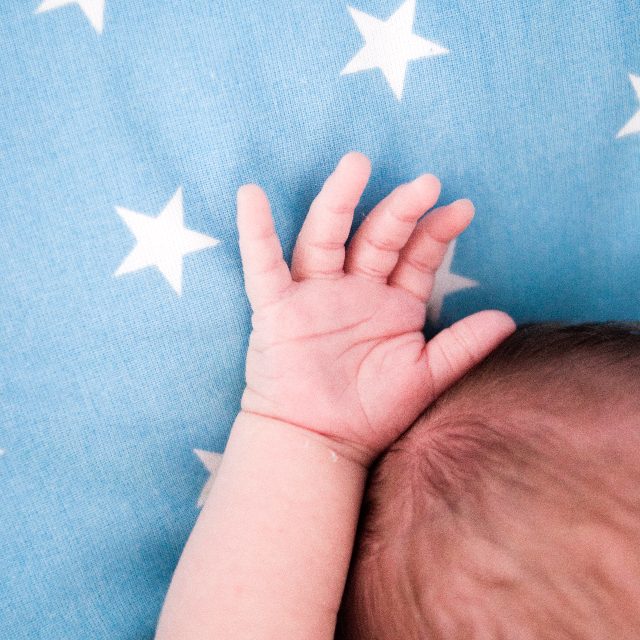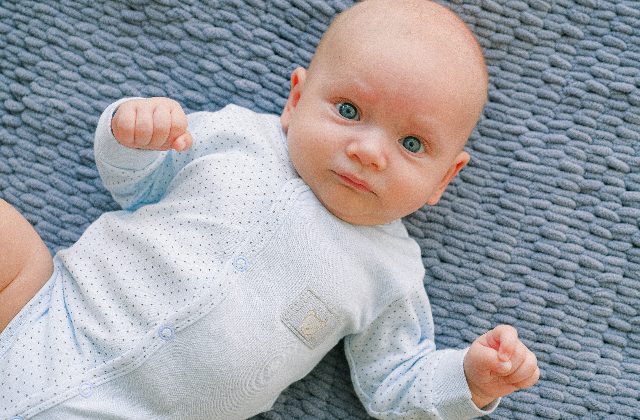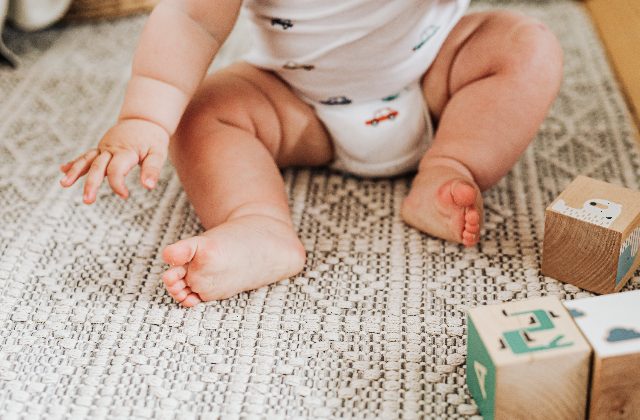
BABY HITTING ME IN THE FACE – Your child may suddenly start hitting you or a sibling, and you may be suffering alone, wondering if you did something wrong.
Parental complaints about a “baby hitting my face” are common. In fact, most toddlers will experience an aggressive phase in which they express their desires through borderline violent physical acts. Although this is normal, it is critical that a parent control these outbursts early on before they spiral out of control.
You are not alone in your concern, and whether your child is hitting you or others, there are specific steps you can take to resolve the issue.

Why Is Baby Hitting Me In The Face?
Toddlers typically lack developed language skills as well as the ability to rationalize. Whereas a baby expresses unmet needs through crying or intense screaming, toddlers express their needs through movement. When an object is taken away from them or a demand is ignored, many toddlers will begin to hit. Whether a toddler hits a parent’s face or an arm, the issue is that a toddler is hitting in general.
Hitting is not a sign of aggression toward the person who is hit by babies under the age of 12 months. Aggressive hitting is typically seen in children aged 18 months and up when they use hitting to express their frustrations and anger. Babies under one year old explore their surroundings by using their hands, mouth, and hitting. They enjoy seeing what happens when they collide with objects and people; cause and effect fascinate babies! Hitting things, especially people, makes a slapping sound, so babies have the added benefit of hearing the consequences of their actions!
What Are Your Options?
Although babies initially hit to explore, if the person they’ve hit laughs or appears surprised, the baby may find this amusing and think it’s a fun game to play. Your baby is not attempting to harm you, but rather to engage in a game with you.
Even if not meant aggressively, flailing fists can cause pain (babies are stronger than they appear!) They may also hit other children. In a toddler, what is an innocent exploration in a baby can turn into aggressive hitting behavior. If you teach your child from a young age that hitting is wrong, he or she is less likely to grow up to be a child who regularly hits adults and other children.
What Should I Do If My Baby Hits Me?
Don’t laugh or put on your best-shocked face. Teach your child that hitting is wrong. Be consistent in your response; sometimes being firm and sometimes laughing will confuse your baby! Tell your baby, “No, don’t hit Mummy, hug Mummy instead,” and then cuddle your baby. For older babies approaching their first birthday, explain that hitting hurts by saying ‘ouch! that hurt Mummy’ and ‘hitting makes me sad’. Playing clapping games, asking your baby to do a high five, or giving him a drum to bang can also help to direct flailing arms and hands. If you do not respond to your baby’s playful slaps, they will grow.
So Why Do Babies Hit
They Are Testing Limits
Like many toddler behaviors (throwing applesauce at your work blouse, screaming in high-pitched tones during rush hour traffic), hitting is motivated by a desire to push the boundaries of what is acceptable.
What will happen if I follow through on this? Learning that hitting their brother with a stick causes him to cry or that beating on a drum is not the same as hitting their mother is all part of their learning process.
They Haven’t Mastered Self-Control.
When dealing with a toddler, their impulse control is virtually non-existent. When they are frustrated, happy, or bored, they hit—without hesitation.
They Have No Idea How Bad It Is.
It’s also true that toddlers use force without being provoked by others, lending credence to the notion that they simply want to see what happens and lack the moral compass or understanding that they can, but should not, harm others.
They Have No Idea How To Deal With Their Emotions. (Baby Hitting My Face)
Another reason toddlers hit themselves and others are that it is their way of dealing with “big” emotions.
They are frustrated, but unlike adults who can calmly express their frustration to a partner or trusted friend.
Toddlers frequently lack the language capacity and self-control to stop, examine how they are feeling, and react in a socially acceptable, appropriate, or helpful manner.
Toddlers may want something, be angry, or believe they have been wronged in some way by a friend.
To be honest, if someone knocked down the massive block tower you’d been working on half an hour, you might want to hit them as well.
What Should You Do If Your Baby Is Hitting Your Face
Fortunately, hitting is not just a “phase” that parents must deal with; there are concrete steps you can take to prevent, control, and redirect hitting toddlers.
While not all of the following options will work for every child, you, as the parent, can decide which ones will. And don’t be afraid to experiment with different options to see which one is best for your child.
Physically Restrain Them.
When your toddler tries to hit others, your instinct may be to physically restrain them. This could be an option for you if you believe your child is out of control or if being physically secure helps to calm them down.
Depending on your size, strength, and ability, this could be physically difficult if your toddler is strong. Physically restraining your toddler should feel like a calm and firm hug that prevents them from hitting themselves or others.
You should also speak calmly to them, informing them that you are holding them because you cannot allow them to hurt anyone. Once the moment has passed, you can redirect them to other behaviors.
- Stay away from contributing factors.
As with many toddler behaviors, the real issue may not be the behavior itself, but how the child is feeling in general.
Are they growing their teeth? Did they get enough sleep, or is it time for a nap? Have they eaten nutritious meals and snacks at regular enough intervals today, or are they hungry when they hit? Are they frustrated about something else that may have contributed to their hitting?
If there isn’t an easy fix, going through the list of other possibilities can help you solve the problem.
Make Opportunities For Physical Activity Available.
If you’ve ever found your children restless and thought to yourself, “They just need to get out and run around,” you already know the truth about the link between physical activity and behavior.
When adults and children get enough physical activity, they are happier, healthier, and better able to control their behaviors. Allow your child to participate in physical activities such as drumming, stomping their feet, running around, jumping, playing on playgrounds, and anything else that gets them moving.
Ensure That All Caregivers Are On The Same Page.
What if you, your parents, and your babysitter all approach hitting in three different ways? While you are using time-outs, Grandma may be laughing it off, saying “no, no,” and moving on. When discussing emotions with the child, the babysitter may use a different language than you.
A discussion with all of your child’s caregivers can ensure that you are attacking the problem with the same strategies, ensuring a united front and a faster resolution.
Prevent Your Baby From Hitting Your Face Before It Happens
Keep an eye on your child and what triggers them to hit. Some children may growl in frustration or emit crying sounds.Be proactive. Take note of the situations that cause your child to hit others and try to avoid them. Do they strike when they are tired or hungry, when they are crowded, or when they must leave a friend’s house? These are common childhood triggers.
If they are hitting others, you may see them approaching other kids to hit. If you identify these factors, it will be easier for you to prevent them before they happen.
- Keep an eye on their media consumption.
It is critical to monitor everything your child watches, including cartoons, to ensure that no violence is depicted. Children who are exposed to violent images in the media are more likely to be aggressive themselves, according to research.
What To Do If Your Child Hit Other Babies
What if your child does not just hit you but other children as well?
If your baby hits another baby with an object, such as the wooden brick he’s holding,
remove the toy from him right away. If he is hitting other children with his hand,
redirect his attention by telling him to pat the baby’s arm instead, while saying ‘gently,’ so he understands that he must touch other babies and children gently.
A baby who hits may be acting out of pain and frustration on occasion. If a baby has an infection, he may hit because he is in pain and cannot express it to you. Take your baby to the doctor if his hitting habits coincide with a change in behavior, such as crying more and becoming irritable.
Never be tempted to gently hit your baby back to teach him that hitting is wrong (or as a way of reprimanding him). This will lead him to believe that hitting is acceptable if Mummy and Daddy do it as well.
What Should You NOT Do If Your Baby Hits?
Hit or spank

If you’re trying to model positive behavior to help your child avoid hitting, they may become confused if you hit yourself. Avoid power struggles involving the use of force.
It’s one thing to walk or carry your toddler to their time-out location, and quite another to forcefully punish them while they’re there. If your child tries to leave the time-out you’ve set up for them, avoid being harsh with them and instead calmly place them back in their time-out spot, explaining what needs to happen, when they can get up, and other details.
Yell Or Become Angry
Toddlers respond best to calm, firm responses rather than screaming, yelling, or acting out in anger.
Even if the situation is truly frustrating, taking a moment to control your own emotions before teaching your toddler will help them see you as an authority figure in charge of their body, voice, words, and expressions.
Base Your Reactions On The Reactions Of Other Parents.
When it comes to behavioral choices, there is a constant sense of mom guilt, mom shaming, and peer pressure in parent circles. Don’t let your emotions dictate the choices you make to help your child with their hitting behaviors.
Step back to re-evaluate your parenting values through self-reflection or conversation with your partner if you find yourself changing your reaction based on your environment or peers.
The Bottom Line
Your toddler may be having a bad day, or they may simply lash out because they are cranky and lack coping skills. They may also be imitating someone else.
Your child may have witnessed an older sibling fighting with a friend and want to do the same. “While it can be upsetting when your child hits someone else, keep in mind that there is no malicious intent behind it. When your child physically lashes out, address the situation right away. Your child means well, they simply need to learn better ways to express themselves, which will come with time.”
Leave a Reply
You must be logged in to post a comment.